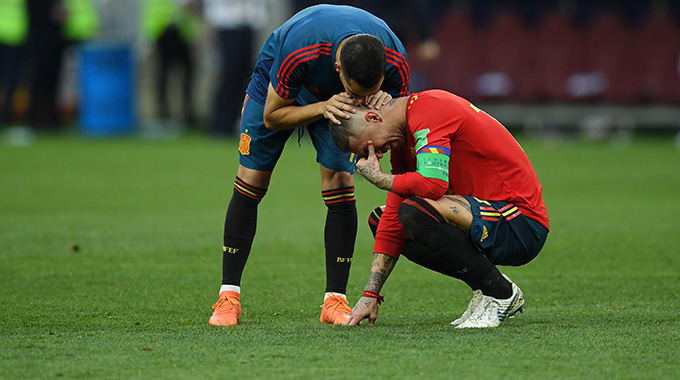SPAIN DOWNED IN RUSSIAN ROULETTE

MOSCOW. — It has been called “death by 1 000 passes.” Yesterday in Moscow, the expression applied more literally than ever — just not how Spain originally intended. The Spaniards crashed out of the 2018 Soccer World Cup in the Round of 16 in stunning fashion, at the hands of Russia on penalties.
They laboured through 120 minutes that ended 1-1, then lost the shoot-out 4-3.
They had smashed a World Cup passing record in those 120 minutes, completing 1 030 of their 1 140. But it was utterly impotent. It was completely bereft of ambition.
They passed their own World Cup campaign to death, and perished in one of the biggest upsets in knock-out round history.
The 1 000 passes were deathly boring, too. They proved once and for all that possession stats are anything but indicators of attacking soccer. Spain played as cautiously as any team at the World Cup. And they paid the price.
Andres Iniesta and Fyodor Smolov cancelled each other out in the opening round of the shoot-out. Gerard Pique smashed Spain’s second in off the post, but 38-year-old Sergei Ignashevich wrong-footed David De Gea to equalise. And then Igor Akinfeev denied Koke to give Russia the advantage.
Aleksandr Golovin then slid his shot underneath a diving De Gea to put Russia in front. Russia held serve. And Akinfeev denied Iago Aspas to send Spain home.
There’s a thought that Spain, aside from their opener against Morocco, have been scoring some very un-Spanish goals at the 2018 World Cup. But the opportunities to score scrappy or lucky goals are some of the many beneficial offshoots of all the possession and probing.
Spain’s attacking-half control yielded a free-kick near the right corner. Sergio Ramos’ clever back-post movement had 39-year-old Sergei Ignashevich scrambling.
And if the Russian defender hadn’t had the ball carom off his calf and into the net, he probably would have been whistled for a penalty.
The goal, one might have thought, should have opened up the game. Russia had to come out of their uber-defensive shell. Spain would have more space going forward. But the reality was just the opposite.
Russia’s approach didn’t change one bit after the early Spanish goal. Spain’s did, though.
They were very content to keep the ball, whether or not it was putting pressure on that bunkered Russian defence.
The result was an extremely dull half-hour, which is just how Spain likes it. La Roja mostly suppressed Russian counters. They strung together 30- and 40-plus passes without Russia completing a single one.
The final first-half tallies had Spain with over 400 passes and Russia with just over 100.
But there’s a balance to find between control and a keep-away game, and Spain couldn’t strike it. They were far too conservative with a mere one-goal lead. Even when Russia’s forwards and midfielders did take chances, and when Spain did play through the press, they rarely went to goal.
In 83 minutes, Spain had 711 passes to Russia’s 162. But they hadn’t had a single shot through 45 minutes. They struggled to penetrate. They rarely infiltrated the penalty box or the dangerous areas just outside it.
All it took one fluke to punish the lack of ambition. One mistake. And Gerard Pique complied with Russian hope late in the first half.
The hosts escaped their defensive half opportunistically, and won a 40th-minute corner. From it Artem Dzyuba eluded Gerard Pique, rose to win the header, and smacked that header right into a flailing Gerard Pique arm. It was a clear-cut penalty. And Dzyuba buried it.
The equaliser took us back to square one.
Russia receded in the second half. Spain seemed content to play in front of Russia’s midfield line, rather than between the lines.
Their three changes — Andres Iniesta for David Silva, Dani Carvajal for Nacho, and Iago Aspas for Diego Costa — didn’t change the shape or balance of the game.
The second half was much like the first, absent the own goal and the penalty. It petered out into extra-time.
Spain were more dangerous with Aspas, and eventually fourth sub Rodrigo, on the field. And they had a convincing penalty shout with five minutes remaining. Pique and Ramos were both hauled down by Russia defenders on a set-piece. The referee’s whistle, though, was non-existent, and the VAR did not advise him to take a second look.
And another half-chance or two, penalties beckoned. And Spain flamed out. — AFP.









Comments